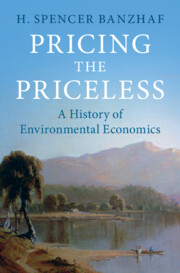Book contents
- Pricing the Priceless
- Historical Perspectives on Modern Economics
- Pricing the Priceless
- Copyright page
- Dedication
- Contents
- Figures
- Acknowledgments
- Acronyms
- Prologue
- 1 Introduction
- 2 Conservation and Preservation
- 3 Do Economists Know about Lupines? Economics versus the Environment
- 4 Consumer Surplus with Apology
- 5 John Krutilla and the Environmental Turn in Natural Resource Economics
- 6 Pricing Pollution
- 7 Lives, Damned Lives, and Statistics
- 8 Benefit–Cost Analysis: Objective or Multi-objective?
- 9 Constructing Markets
- Epilogue
- References
- Index
- Other Books in the Series
4 - Consumer Surplus with Apology
Published online by Cambridge University Press: 19 October 2023
- Pricing the Priceless
- Historical Perspectives on Modern Economics
- Pricing the Priceless
- Copyright page
- Dedication
- Contents
- Figures
- Acknowledgments
- Acronyms
- Prologue
- 1 Introduction
- 2 Conservation and Preservation
- 3 Do Economists Know about Lupines? Economics versus the Environment
- 4 Consumer Surplus with Apology
- 5 John Krutilla and the Environmental Turn in Natural Resource Economics
- 6 Pricing Pollution
- 7 Lives, Damned Lives, and Statistics
- 8 Benefit–Cost Analysis: Objective or Multi-objective?
- 9 Constructing Markets
- Epilogue
- References
- Index
- Other Books in the Series
Summary
Benefit-cost practitioners in the mid twentieth century, forced by government agencies to value outdoor recreation, continued to struggle with how to do so. One outside expert, Harold Hotelling, recommended what became known as the travel cost model. This approach measures the demand for recreation based on how much people are willing to pay for a trip in terms of travel costs. It also measures the value of a trip in terms of consumer surplus, or the additional value recreationists have above the travel costs they pay. Although the method eventually became stardardized, it initially was received with skepticism and confusion. Consumer surplus was an archaic, theoretical construct with little grounding in realty. This chapter discusses how economists like Marion Clawson and Jack Knetsch overcame their skepticism.
Keywords
- Type
- Chapter
- Information
- Pricing the PricelessA History of Environmental Economics, pp. 77 - 97Publisher: Cambridge University PressPrint publication year: 2023



